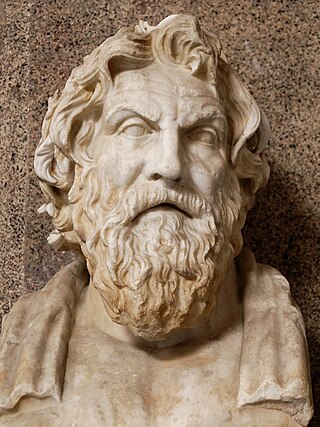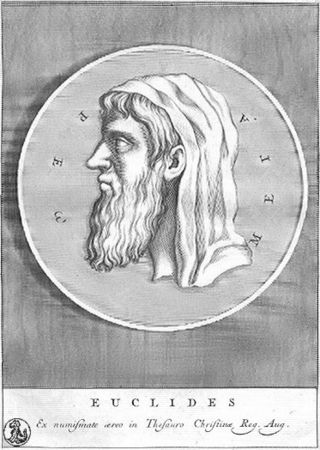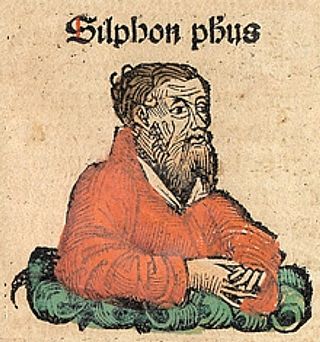
Eubulides of Miletus was a philosopher of the Megarian school who is famous for his paradoxes.

Zeno of Citium was a Hellenistic philosopher from Citium, Cyprus. He was the founder of the Stoic school of philosophy, which he taught in Athens from about 300 BC. Based on the moral ideas of the Cynics, Stoicism laid great emphasis on goodness and peace of mind gained from living a life of virtue in accordance with nature. It proved very popular, and flourished as one of the major schools of philosophy from the Hellenistic period through to the Roman era, and enjoyed revivals in the Renaissance as Neostoicism and in the current era as Modern Stoicism.

Chrysippus of Soli was a Greek Stoic philosopher. He was a native of Soli, Cilicia, but moved to Athens as a young man, where he became a pupil of the Stoic philosopher Cleanthes. When Cleanthes died, around 230 BC, Chrysippus became the third head of the Stoic school. A prolific writer, Chrysippus expanded the fundamental doctrines of Cleanthes' mentor Zeno of Citium, the founder and first head of the school, which earned him the title of the Second Founder of Stoicism.

Antisthenes was a Greek philosopher and a pupil of Socrates. Antisthenes first learned rhetoric under Gorgias before becoming an ardent disciple of Socrates. He adopted and developed the ethical side of Socrates' teachings, advocating an ascetic life lived in accordance with virtue. Later writers regarded him as the founder of Cynic philosophy.
Menedemus of Eretria was a Greek philosopher and founder of the Eretrian school. He learned philosophy first in Athens, and then, with his friend Asclepiades, he subsequently studied under Stilpo and Phaedo of Elis. Nothing survives of his philosophical views apart from a few scattered remarks recorded by later writers.

Euclid of Megara was a Greek Socratic philosopher who founded the Megarian school of philosophy. He was a pupil of Socrates in the late 5th century BC, and was present at his death. He held the supreme good to be one, eternal and unchangeable, and denied the existence of anything contrary to the good. Editors and translators in the Middle Ages often confused him with Euclid of Alexandria when discussing the latter's Elements.
Metrocles was a Cynic philosopher from Maroneia. He studied in Aristotle’s Lyceum under Theophrastus, and eventually became a follower of Crates of Thebes, who married Metrocles’ sister Hipparchia. Very little survives of his writings, but he is important as one of the first Cynics to adopt the practice of writing moral anecdotes (chreiai) about Diogenes and other Cynics.

Stilpo or Stilpon, in Latin sources also Stilbo or Stilbon, was a Greek philosopher of the Megarian school. He was a contemporary of Theophrastus, Diodorus Cronus, and Crates of Thebes. None of his writings survive, but he is described in the writings of others as being interested in logic and dialectic, and he argued that the universal is fundamentally separated from the individual and concrete. His ethical teachings approached that of the Cynics and Stoics. His most important followers were Pyrrho, the founder of Pyrrhonism, and Zeno of Citium, the founder of Stoicism.
Aristo of Chios, also spelled Ariston, was a Greek Stoic philosopher and colleague of Zeno of Citium. He outlined a system of Stoic philosophy that was, in many ways, closer to earlier Cynic philosophy. He rejected the logical and physical sides of philosophy endorsed by Zeno and emphasized ethics. Although agreeing with Zeno that Virtue was the supreme good, he rejected the idea that morally indifferent things such as health and wealth could be ranked according to whether they are naturally preferred. An important philosopher in his day, his views were eventually marginalized by Zeno's successors.
Diodorus Cronus was a Greek philosopher and dialectician connected to the Megarian school. He was most notable for logic innovations, including his master argument formulated in response to Aristotle's discussion of future contingents.
The Eretrian school of philosophy was originally the School of Elis, where it had been founded by Phaedo of Elis; it was later transferred to Eretria by his pupil Menedemus. It can be referred to as the Elian-Eretrian School, on the assumption that the views of the two schools were similar. It died out after the time of Menedemus, and, consequently, very little is known about its tenets. Phaedo had been a pupil of Socrates, and Plato named a dialogue, Phaedo, in his honor, but it is not possible to infer his doctrines from the dialogue. Menedemus was a pupil of Stilpo at Megara before becoming a pupil of Phaedo; in later times, the views of his school were often linked with those of the Megarian school. Menedemus' friend and colleague in the Eretrian school was Asclepiades of Phlius.
This page is a list of topics in ancient philosophy.
Philo the Dialectician was a Greek philosopher of the Megarian (Dialectical) school. He is sometimes called Philo of Megara although the city of his birth is unknown. He is most famous for the debate he had with his teacher Diodorus Cronus concerning the idea of the possible and the criteria of the truth of conditional statements.
Hermodorus, an Ephesian who lived in the 4th century BC, was an original member of Plato's Academy and was present at the death of Socrates. He is said to have circulated the works of Plato, and to have sold them in Sicily. Hermodorus himself appears to have been a philosopher, for we know the titles of two works that were attributed to him: On Plato, and On Mathematics.
Bryson of Achaea was an ancient Greek philosopher.
Panthoides was a dialectician and philosopher of the Megarian school. He concerned himself with "the logical part of philosophy", and at some point taught the Peripatetic philosopher Lyco of Troas. He wrote a book called On Ambiguities, against which the Stoic philosopher Chrysippus wrote a treatise.

Cynicism is a school of thought in ancient Greek philosophy, originating in the Classical period and extending into the Hellenistic and Roman Imperial periods. According to Cynicism, people are reasoning animals, and the purpose of life and the way to gain happiness is to achieve virtue, in agreement with nature, following one's natural sense of reason by living simply and shamelessly free from social constraints. The Cynics rejected all conventional desires for wealth, power, glory, social recognition, conformity, and worldly possessions and even flouted such conventions openly and derisively in public.
Dionysius of Chalcedon was a Greek philosopher and dialectician connected with the Megarian school. He was a native of Chalcedon on the coast of Bithynia. Dionysius was the person who first used the name Dialecticians to describe a splinter group within the Megarian school "because they put their arguments into the form of question and answer". One area of activity for the dialecticians was the framing of definitions, and Aristotle criticises a definition of life by Dionysius in his Topics:
This is, moreover, what happens to Dionysius' definition of "life" when stated as "a movement of a creature sustained by nutriment, congenitally present with it"
Pasicles of Thebes was a Greek philosopher and brother of the Cynic philosopher Crates of Thebes. He attended the lectures of his brother Crates, but he is otherwise connected with the Megarian school of philosophy, because Diogenes Laërtius calls him a pupil of Euclid of Megara, and the Suda calls him a pupil of an unknown "Dioclides the Megarian." Pasicles is said to have been the teacher of Stilpo, who became leader of the Megarian school. Thus we have the implausible situation of Pasicles teaching Stilpo, Stilpo teaching Crates, and Crates teaching Pasicles. Crates named his son Pasicles.
Stoic logic is the system of propositional logic developed by the Stoic philosophers in ancient Greece.






